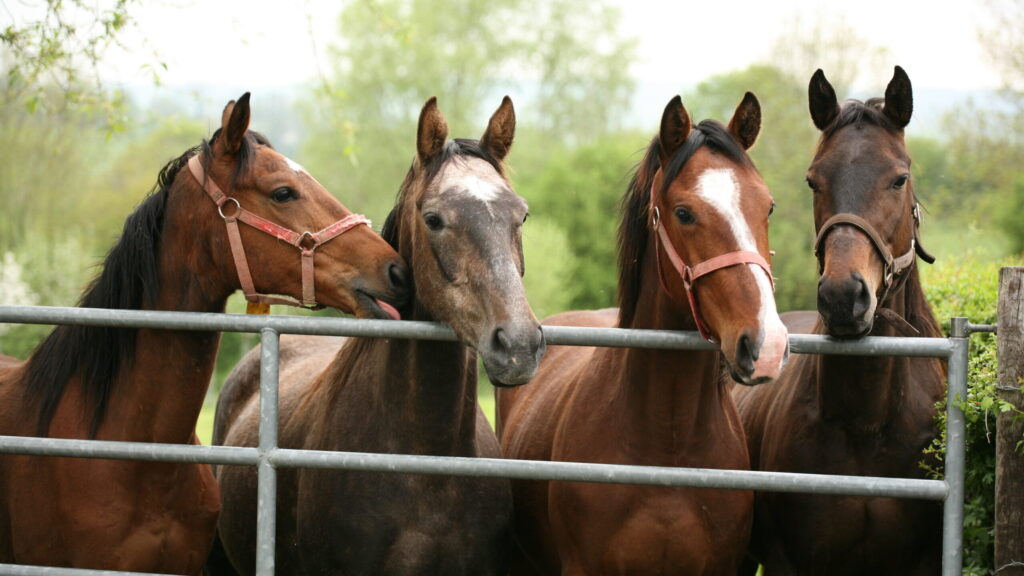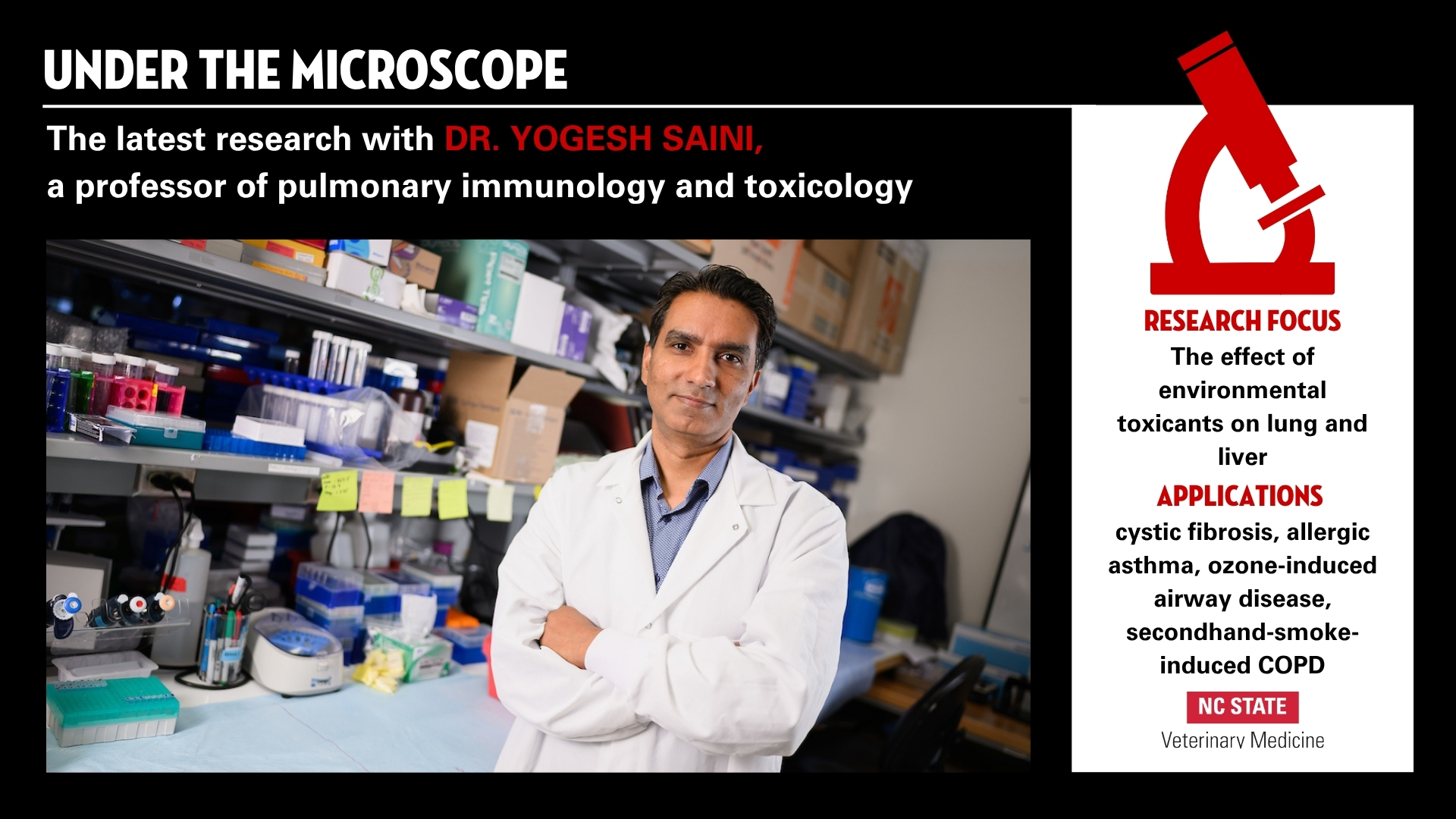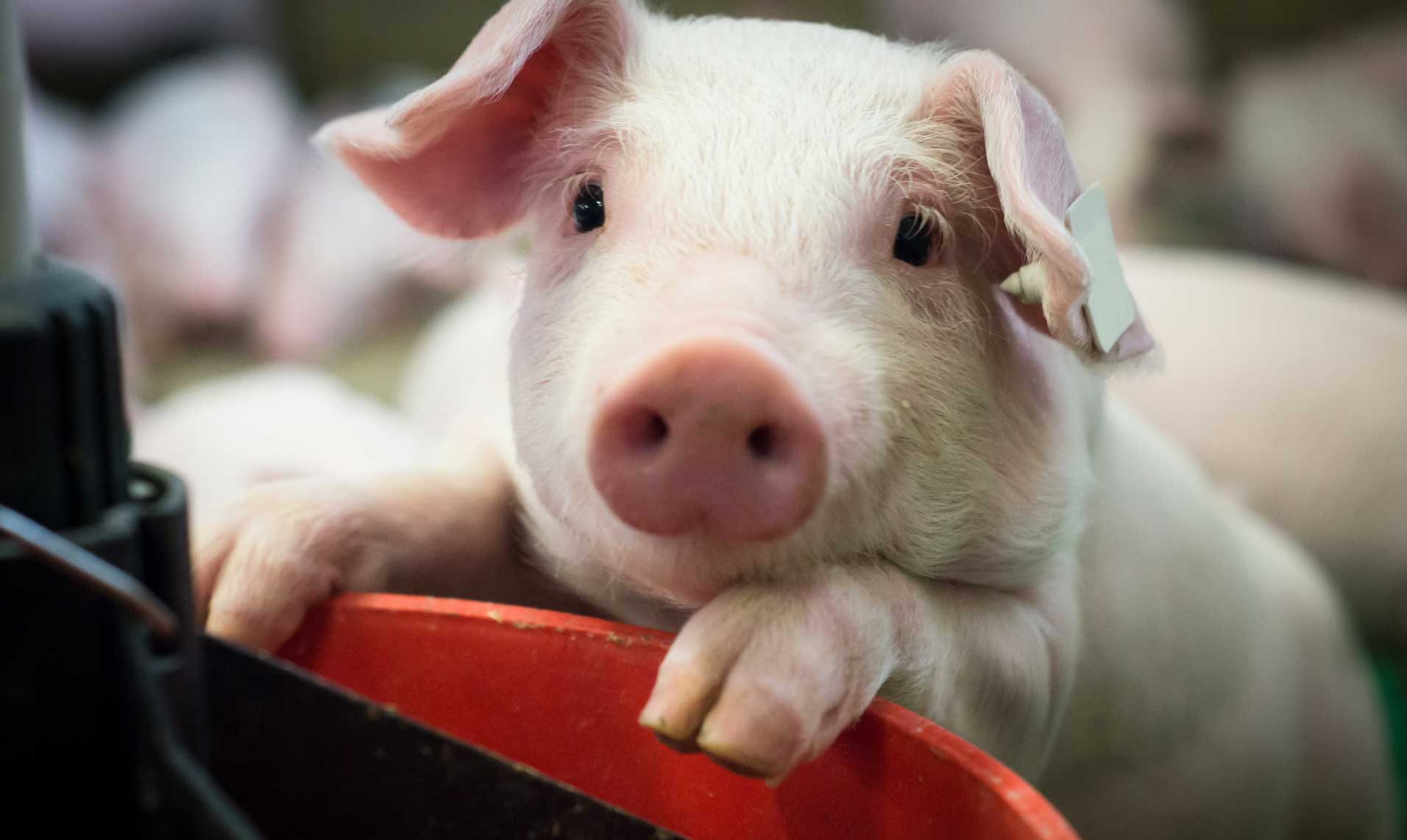Research Roundup NC State Veterinary Medicine, March 2023
NC State College of Veterinary Medicine aims to make the world a better place for both humans and animals. From investigating the effects of radioactivity in Eastern Europe to enhancing agricultural sustainability in the Galápagos Islands, our researchers are making discoveries and advancing medicine around the globe.

Investigating Chernobyl’s Genetic Effects on Animals and Humans
Gabriella Spatola, Reuben Buckley, Megan Dillon, Emily Dutrow, Jennifer Betz, Małgorzata Pilot, Heidi Parker, Wiesław Bogdanowicz, Rachel Thomas, Ihor Chyzhevskyi, Gennadi Milinevsky, Norman Kleiman, Matthew Breen, Elaine Ostrander, Timothy Mousseau
Several scientific and medical entities, including the NC State College of Veterinary Medicine, are investigating the lasting effects of the Chernobyl Nuclear Power Plant accident. A team of researchers, including NC State’s Matthew Breen, Megan Dillon and Rachael Thomas, collected and characterized the genetic structure of 302 free-roaming dogs living within the power plant itself as well as dogs living 15 to 45 kilometers from the disaster site. The collaborative team of international researchers hope their work leads to a clearer understanding of the effect long-term radiation exposure has on the genetics and health of large mammals, including humans, living in the area of the disaster. The study is the first stage in a larger project that looks to determine how these dogs have adapted to one of the most radioactive places on the planet.
The study was published in Science Advances and can be read here.

Enhancing the Lymphatic Flow in Ailing Horses
Drew Koch, Lauren Schnabel, Justin Reynolds, Clifford R. Berry
Limb lymphedema, caused by poor lymphatic drainage, can be debilitating and painful for both humans and horses. Pneumatic compression therapy has proven to be very beneficial for people struggling with lymphedema. This treatment uses devices that fit like sleeves around the lower leg and pumps that inflate and deflate every so often, which helps increase blood flow. In an effort to improve treatments for horses, researchers from our Departments of Clinical Sciences and Molecular Biomedical Sciences studied whether a new equine-specific pneumatic compression device — similar to the device in human medicine — would help the lymphatic flow of healthy horse forelimbs. The results confirmed that the device, termed the EQ Press, did enhance lymphatic flow in the forelimbs of healthy horses. These encouraging results warrant further study of the EQ Press, this time in horses clinically afflicted by lymphedema and other lymphatic drainage disorders.
The full study can be found in the American Journal of Veterinary Research and read here.
Determining Whether Wind Speed and Landscape Affect Disease Spread in Poultry Raised in Open Environments
Olivia Smith, Kevin Cornell, Michael Crossley, Rocio Crespo, Matthew Jones, William Snyder, Jeb Owen
In recent years, there has been an emphasis on raising farm animals without the use of antibiotics and in rotational pastures, with the goal of reducing human disease and improving animal welfare. However, with animals spending more time outside in pastures, there is a new need to research how environmental and farm management factors can impact the introduction and spread of pathogens like Campylobacter, the largest single contributor to foodborne illness in the United States. To address this, a team of researchers, including our Department of Population Health and Pathobiology’s Dr. Rocio Crespo, surveyed the prevalence of Campylobacter in 62 flocks in rotational pastures over a three-year period. The results of the study suggested that farms located in areas that usually have higher wind speeds and farms located in highly agricultural areas are at greater risk of Campylobacter being introduced into their flocks. The research shows that as farming practices change and evolve to improve animal welfare, there also needs to be an emphasis on new ways to manage infectious disease in poultry to protect the health of both animals and humans.
You can read the study, published in Animals, here.
Finding Alternative Treatments to Avoid Anaphylaxis
Barry A Hedgespeth, Douglas B Snider, Katie Bitting, Glenn Cruse
Anyone with a severe allergy knows to take great precautions against their trigger to avoid anaphylaxis, a severe and potentially fatal allergic reaction. Immune cells, called mast cells, are believed to be responsible for driving anaphylaxis in humans. Most commonly, treatment for a severe reaction is an immediate injection of epinephrine and a trip to the emergency room for medical care. Unfortunately, there aren’t many options for long-term treatment to avoid these very scary situations. The treatments that do exist, like immunotherapy, are often time-consuming, not always successful and require that a person know his or her trigger. In response to the glaring need for alternative treatments for mast cell-mediated diseases, members of the Cruse Lab, based at NC State College of Veterinary Medicine, conducted a study using a specific type of gene therapy, termed KitStop, to possibly decrease the severity of anaphylaxis by depopulating mast cells in tissues. The results of the study showed that the KitStop treatment did significantly reduce systemic mast cell responses, indicating that KitStop has great potential as an alternative treatment method for patients with a high risk of experiencing anaphylaxis.
Read the full study and results, published in Frontiers in Immunology, here.

Enhancing Animal Health and Promoting Sustainable Agriculture Across the Galápagos Islands
Sarah Rhea, Blanca E Camacho, Carrisa W Amoriello, Maria Correa, Gregory Lewbart, Marilyn Cruz, Alberto Vélez, Paulina Castillo, Monique Pairis-Garcia
Across Latin America, including in Ecuador’s Galápagos Islands, smallholder farms play a critical role in food safety and security. Given that production-animal populations continue to increase in the Galápagos Islands, it is critical to ensure that the health of humans, animals and ecosystems are sustainably protected. There had not been any formal assessments of production-animal welfare conducted in the Galápagos Islands, which is why NC State College of Veterinary Medicine’s Sarah Rhea, Monique Pairis-Garcia, Blanca Camacho, Maria Correa, Carrisa Amoriello and Gregory Lewbart co-authored a study that used multiple U.S. and international assessment standards to develop a questionnaire and conducted interviews with several of the Floreana Island smallholder farms. The team identified opportunities to enhance animal health management practices and established the need to promote organized farm biosecurity, access to veterinary care and antimicrobial resistance surveillance. These measures can help ensure animal welfare and sustainable agriculture across the islands to protect the people, animals and the environment.
The study was published in Animals and can be read here.
Research Connection: Advancing Testing and Treatment of Feline Chronic Kidney Disease with Dr. Shelly Vaden
Dr. Vaden’s scholarly and clinical activity has primarily involved diseases of the kidney and lower urinary tract of dogs and cats. In this interview, we spoke to her specifically about Chronic Kidney Disease in cats. Unfortunately, this disease is quite common, especially in older cats, and can do irreversible damage. Dr. Vaden and colleagues are researching and discovering new ways to diagnose and treat CKD, which is paramount to the comfort and quality of life of affected cats. Dr. Vaden also recently became president-elect of the new American College of Veterinary Nephrology and Urology (ACVNU), which will be able to apply for permanent status after four years. Her dedication and research have been integral in the advancement of these fields of study.
- Categories:


